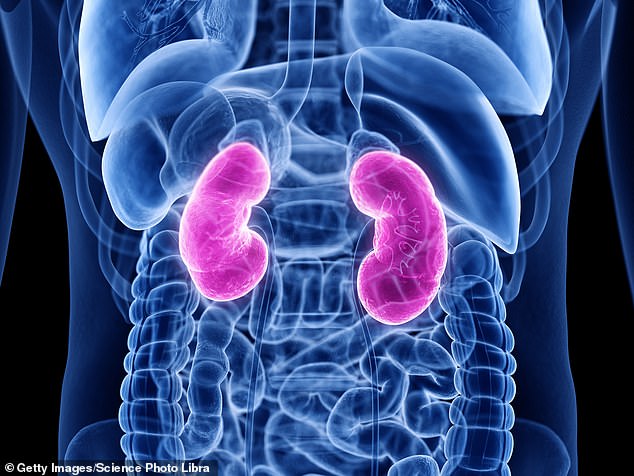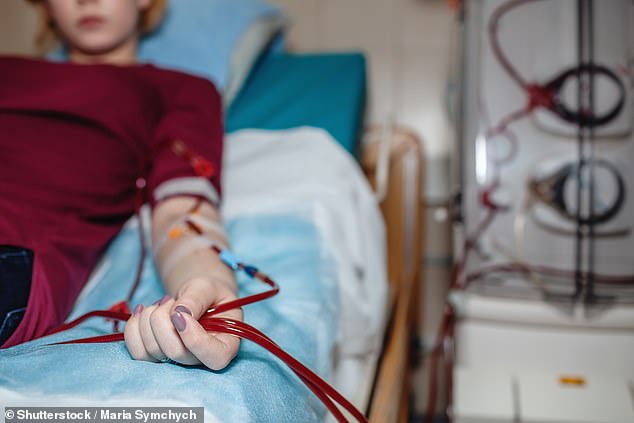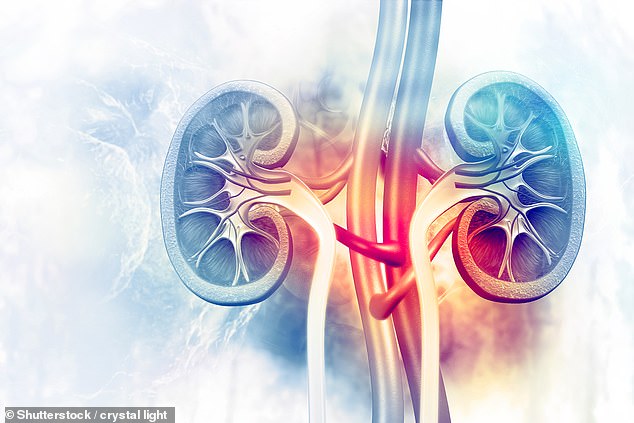Thousands of patients with chronic kidney disease are being diagnosed too late to benefit from potentially life-saving treatments.
The lack of tests to detect this incurable disease means that almost two-thirds of all patients are diagnosed only after the disease has progressed to a dangerously advanced stage.
This despite their doctors knowing that almost half of all new patients were at risk of kidney disease, which affects 7.2 million in the UK.
Experts say that as a result, thousands of patients unnecessarily end up on dialysis: a blood-cleansing treatment that requires several trips to the hospital each week, with each session lasting hours.

Thousands of patients with chronic kidney disease are being diagnosed too late to benefit from potentially life-saving treatments.
Hundreds will also end up needing a kidney transplant, when the organ eventually fails, and can often wait several years for the procedure.
The surprising findings, published by the charity Kidney Research UK, come as the NHS faces a looming kidney disease crisis.
Over the next decade, the number of patients with kidney disease is expected to increase by around 400,000, mainly due to obesity.
By 2033, this condition is likely to cost the NHS more than £10 billion a year, up from £6 billion last year.
This is largely due to the high price of financing dialysis treatment to clean the blood of some 140,000 of the most seriously ill patients.
Kidney Research UK says the worrying number of late diagnoses is increasing the severity of the crisis and causing “significant and irreversible harm to patients”.


Experts say that as a result, thousands of patients unnecessarily end up on dialysis: a blood-cleansing treatment that requires several trips to the hospital each week, with each session lasting hours.
One patient diagnosed too late is Stephen Blom, a former competitive cyclist who now has to spend three mornings a week on dialysis in hospital while he waits for his second kidney transplant.
The 45-year-old, from Paisley, is angry because, despite his telltale symptoms, it took doctors too long to diagnose him.
This oil industry worker regularly trained for cycle races in the Alps and could cover 100 miles in four hours. However, over time, his performance decreased.
He said: ‘I had all these unexplainable symptoms: ear infections, colds that wouldn’t go away, flu, really low energy levels. This continued for a while.
‘When the doctors tested my blood, they told me I had high blood pressure and high cholesterol, which I now know are two of the main risk factors for kidney failure.
“But instead of treating me for kidney disease, they said I didn’t take care of myself.”
A year later, Stephen was referred for a kidney scan, which revealed the organ was severely damaged.
A few months later he began dialysis but, in 2015, he was forced to undergo surgery to receive a new kidney.


Hundreds of people will also end up needing a kidney transplant when the organ eventually fails, and they can often wait several years for the procedure.
This kidney is now failing and Stephen is desperate for a second transplant.
“With an earlier diagnosis, I could have started treatment that would have dramatically slowed the progression of the disease,” Stephen says.
“That’s where the anger comes in.”
Chronic kidney disease occurs when the kidneys (which remove waste products from the blood and make urine) no longer work as well as they should.
It usually worsens over time and the damage cannot be reversed.
Patients usually experience few symptoms at first, but as the disease progresses they may experience fatigue, difficulty breathing, swelling of the ankles, feet or hands, as well as blood in the urine.
High blood pressure and diabetes are common causes, as are kidney infections and long-term use of anti-inflammatory medications.
If diagnosed early, exercise and a healthy diet can help slow the progression of kidney disease, as can medications for high blood pressure and diabetes.
Specialized treatments, including a daily tablet called empagliflozin, a relatively new drug, can dramatically reduce the risk of progression.
In the worst cases, patients need dialysis to take care of failing kidneys, while 3,600 adults in the UK receive a kidney transplant each year.
Earlier this year, The Mail on Sunday revealed that thousands of kidney disease patients didn’t even know they had the condition because their GP hadn’t told them.


Over the next decade, the number of patients with kidney disease is expected to increase by around 400,000, mainly due to obesity.
We also reported that patients with heart disease and diabetes were not warned that they were at risk of developing the irreversible disease.
Experts said patients were not being informed of their diagnosis based on “outdated” views that there were no effective treatments to slow its progression.
Kidney Research UK says it is crucial for GPs to look for early signs of the disease.
“Newly recommended drugs may slow the progression of kidney disease, but not only are they offered to too few eligible patients, many patients are also losing valuable time protecting their kidneys due to late diagnosis,” says Alison Railton, head of policy and external affairs at Kidney Research UK.
“Our survey results alarmingly show that patients suffer unnecessarily due to late diagnosis.”

